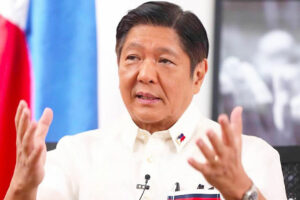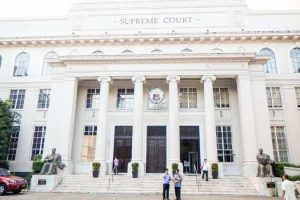Marcos asks court to reject suit vs presidential win

PRESIDENT-ELECT Ferdinand R. Marcos, Jr. has asked the Supreme Court to reject a lawsuit seeking to void his landslide win and protect the vote of 31 million Filipinos.
In a 45-page petition, the son and namesake of the late dictator said the Presidential Electoral Tribunal, not the High Court, has the power to pass on his eligibility to run for president.
“The petition must be dismissed for lack of jurisdiction,” he said through lawyer Estelito P. Mendoza. “At this point, it is only the Presidential Electoral Tribunal (PET) which may inquire into [my] eligibility”.
A group of taxpayers on May 16 asked the high tribunal to stop the count and void Mr. Marcos’ candidacy since he is allegedly unfit to become president after he was convicted of tax evasion in the 1990s.
The plaintiffs seek to overturn a Commission on Elections (Comelec) ruling allowing Mr. Marcos, better known as Bongbong, to run for president on May 9, accusing him of lying about his qualifications.
They said the election body had gravely abused its authority by failing to disqualify Mr. Marcos despite his conviction.
They also argued that Comelec should have barred his candidacy because criminals are perpetually disqualified from running for public office.
Congress proclaimed Mr. Marcos the winner of the presidential race on May 25 in the absence of a restraining order from the High Court.
The tribunal earlier ordered him, the Senate, House of Representatives and Comelec to comment on the lawsuit.
In his pleading, Mr. Marcos argued that the 1987 Constitution only requires the president to be a natural-born Filipino citizen, a registered voter, can read and write, at least 40 years old and has lived in the Philippines for at least 10 years.
The plaintiffs have accused Mr. Marcos of lying about his qualifications for president, adding that his conviction for tax evasion involved moral turpitude.
Martial Law victims of Mr. Marcos’ father, the late dictator Ferdinand E. Marcos, have filed a similar lawsuit.
The Comelec full court earlier affirmed a Second Division ruling that said Mr. Marcos did not mislead the public when he said in his certificate of candidacy that he was eligible to run for president. It also threw out several appeals that sought to disqualify the leading presidential bet due to his conviction.
“In view of respondent Marcos Jr.’s material misrepresentations in his certificate of candidacy (CoC), this court must cancel or deny due course to his CoC, declaring the same void ab initio,” the plaintiffs said earlier.
“Respondent Marcos Jr. must be deemed to have never been a candidate from the very beginning, his candidacy invalidated, and the votes attributed to him considered stray,” they added.
The en banc earlier affirmed a ruling by Commissioner Aimee P. Ferolino, who in February said there is no law punishing one’s failure to file income tax returns.
Retired Election Commissioner Maria Rowena V. Guanzon had accused her of delaying the case so her vote for disqualification would not count. She also said a senator from Davao was meddling in the case.
Mr. Marcos won the May 9 election by a landslide to clinch a remarkable comeback for his family, which is still facing court cases involving ill-gotten wealth and unpaid taxes.
He is the first candidate to win a majority in a Philippine presidential election since his father’s two-decade rule.
Mr. Marcos fled into exile in Hawaii with his family during a February 1986 “people power” street uprising that ended his father’s autocratic 20-year rule. He served as a congressman and senator after his return to the Philippines in 1991.
Political analysts earlier said the possibility of incoming Vice-President Sara Duterte-Carpio copying the path of a nine-year presidency forged by ex-President Gloria Macapagal Arroyo would be hard to ignore.
Ms. Arroyo as vice-president succeeded then President Joseph E. Estrada after his ouster by a popular street uprising in January 2001, three years short of the single six-year term of a Philippine president. She served six more years as president after winning in 2004 amid allegations of cheating. — Kyle Aristophere T. Atienza




